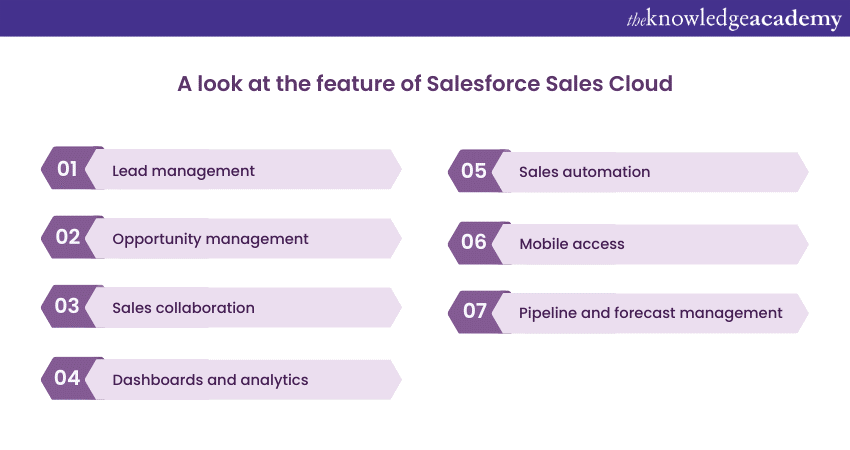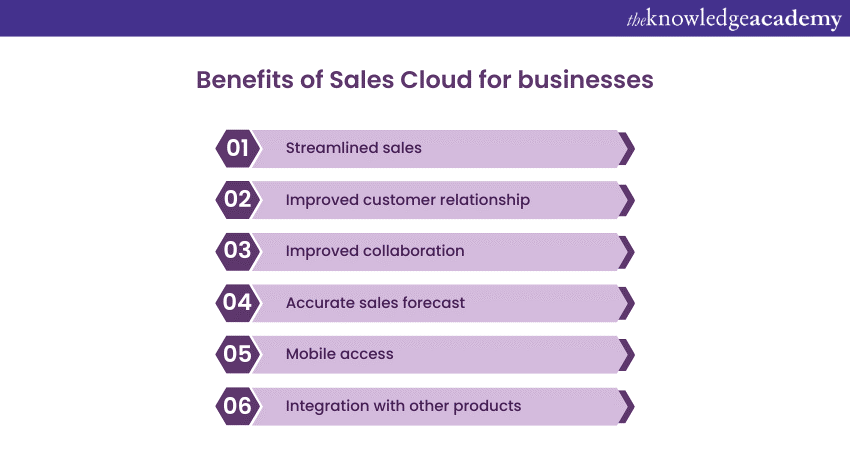We may not have the course you’re looking for. If you enquire or give us a call on +39 800580270 and speak to our training experts, we may still be able to help with your training requirements.
We ensure quality, budget-alignment, and timely delivery by our expert instructors.

In a competitive business landscape, effective sales management and customer focus are crucial for the growth and success of any organisation. Businesses are turning to smart tools and solutions like Sales Cloud to streamline and optimise the sales process. Salesforce Sales Cloud is a component that enhances the efficiency of a company's sales team. Read this blog to learn the features of Salesforce Sales Cloud, its plans and benefits.
Table of Contents
1) What is Salesforce Sales Cloud?
2) Features of Sales Cloud
a) Lead and opportunity management
b) Contact and account management
c) Sales collaboration
d) Sales analytics and reporting
3) Different editions of Sales Cloud
4) Conclusion
What is Salesforce Sales Cloud?
Salesforce Sales Cloud is a CRM platform designed to empower sales teams. It centralises customer data, automates tasks, and provides insights through robust reporting. With mobile access and integration capabilities, it streamlines sales processes, enhances collaboration, and drives revenue growth. It is a powerful tool for success in the competitive marketplace.
With Salesforce Sales Cloud, businesses can effectively manage their sales pipeline from lead generation to deal closure. It allows sales representatives to track and organise leads, contacts, and accounts in a structured manner. The platform provides a holistic view of customer interactions and enables sales teams to nurture and convert leads into customers more efficiently. Additionally, Salesforce Service Cloud complements this by offering robust customer service tools to further enhance customer satisfaction.
Learn about the Salesforce services and their essential components with SalesForce Service Cloud Training.
Features of Sales Cloud
Salesforce Sales Cloud offers many features that empower sales teams to streamline processes and achieve greater efficiency. These features enable sales teams to streamline workflows, improve collaboration, make data-driven decisions, and drive revenue growth.

Salesforce Sales Cloud provides a comprehensive suite of tools that empower sales professionals to excel in their roles and succeed. Here are some key features.
Lead and opportunity management
Sales Cloud provides a centralised system for managing leads and opportunities. It allows sales representatives to track and organise leads, assign tasks, and prioritise follow-ups. This feature ensures a systematic approach to lead qualification and helps sales teams focus on high-potential opportunities.
Contact and account management
Salesforce Sales Cloud offers comprehensive contact and account management capabilities. It enables sales teams to maintain detailed customer profiles, including contact information, communication history, and account hierarchies. This feature ensures sales reps have a complete view of their customers and can personalise interactions accordingly.
Sales collaboration
Sales Cloud facilitates seamless collaboration among sales team members. It includes features such as Chatter, a social collaboration tool where team members can share real-time updates, documents, and insights. This promotes better communication, knowledge sharing, and collaboration within the sales organisation.
Sales analytics and reporting
Salesforce Sales Cloud provides robust reporting and analytics capabilities. Sales managers can create custom reports and dashboards to gain insights into key performance metrics, pipeline health, and sales forecasts. This feature enables data-driven decision-making, identifies areas for improvement, and helps sales teams track their progress towards goals.

Sales automation
Salesforce Sales Cloud, along with Salesforce CLI, automates manual and repetitive tasks, reducing administrative burdens for sales representatives. It includes workflow automation, email templates, and task automation, enabling sales teams to focus on revenue-generating activities and customer interactions.
Mobile access
Salesforce Sales Cloud offers mobile access, empowering sales representatives to access customer information, update records, and collaborate. This feature ensures that sales teams are equipped with real-time data and can be responsive to customer needs from anywhere, anytime.
Integration capabilities
Salesforce Sales Cloud seamlessly integrates with other Salesforce products and third-party applications. This allows businesses to extend their functionality and create a unified ecosystem for sales operations. Integrating with marketing automation tools, customer service systems, or finance platforms ensures a connected and efficient sales process.
Pipeline and forecast management
Salesforce Sales Cloud offers pipeline and forecast management capabilities. It allows sales teams to track and manage their sales pipeline, including the stages of deals and associated probabilities. This feature provides visibility into the sales pipeline, helps prioritise opportunities, and enables accurate forecasting of future sales.
Learn all the essential skills to use Salesforce CRM and boost your sales with our comprehensive Salesforce CRM Masterclass.
Different editions of Sales Cloud
Salesforce Sales Cloud offers different plans (or solutions) to meet specific business needs. Each type of plan provides a range of features and scalability options, ensuring that sales teams can find the right fit for their specific requirements.
a) Sales Cloud Essentials: Designed for small businesses, Salesforce Sales Cloud Essentials provides essential CRM functionality, including lead and opportunity management, contact and account management, collaboration tools, and basic reporting. It offers a simplified and affordable solution for small sales teams.
b) Sales Cloud Professional: It is a comprehensive CRM solution for small to medium-sized businesses. It includes advanced features such as forecasting, workflow automation, customisable dashboards, and integration capabilities. Sales teams can efficiently manage their pipeline, improve productivity, and gain insights into sales performance.
c) Sales Cloud Enterprise: It is designed for larger organisations with more complex sales processes and teams. It offers enhanced customisation options, advanced analytics, territory management, and comprehensive sales forecasting. Enterprise provides scalability and flexibility to meet the demands of growing businesses.
d) Sales Cloud Unlimited: It is the most feature-rich and scalable version of Salesforce Sales Cloud. It includes all the capabilities of Enterprise edition and additional features such as unlimited API access, enterprise support, and sandbox environments for testing and development. Sales Cloud Unlimited is ideal for large enterprises with complex sales operations and extensive customisation needs.
Salesforce regularly updates its offerings and may introduce or modify new editions. Therefore, it's advisable to refer to the official Salesforce website or consult with a Salesforce representative to get the most up-to-date information on the available types of Sales Cloud.
Learn to build custom apps that boost productivity and improve your business with Salesforce Lightning Masterclass.
How does Sales Cloud help businesses?
Sales Cloud is crucial in empowering sales teams and driving business success. Here are key reasons why Sales Cloud is essential.

a) Streamlining sales processes through automation and reducing administrative burdens.
b) Enhancing customer relationships with comprehensive customer views and personalised interactions.
c) Improving collaboration and communication among sales team members in real-time.
d) Enabling data-driven decision-making through robust reporting and analytics capabilities.
e) Providing accurate sales forecasting by managing the sales pipeline effectively.
f) Salesforce Sales Cloud offers mobile access for increased flexibility and productivity on the go.
g) Facilitating seamless integration with other Salesforce products and third-party applications for a connected sales ecosystem.
It is also interesting to note that Sales Cloud isn’t just for the sales team. It can also benefit other departments. Here’s how other roles and departments can benefit from it:
a) Marketing Teams: Salesforce Sales Cloud integration with marketing automation tools allows marketing teams to align their efforts with sales activities. They can track campaign effectiveness, capture leads, and seamlessly hand them to the sales team for further nurturing and conversion.
b) Customer Support Teams: Its integration with customer service systems gives customer support teams a complete view of customer interactions, purchase history, and account details. This information helps them deliver personalised and efficient support, enhancing the customer experience.
c) Accounting and Finance Teams: Salesforce Sales Cloud can benefit accounting and finance teams by providing accurate and up-to-date sales data. They can use this data for financial forecasting, revenue recognition, and analysing sales performance, improving financial management and decision-making.
d) Executives and Business Leaders: It provides executives and business leaders real-time visibility into sales performance, revenue forecasts, and customer insights. With the added security of the Salesforce Security Token, they can make informed decisions, track progress towards goals, and align sales strategies with overall business objectives.
Learn best practices in the Salesforce CRM Guide!
Conclusion
Salesforce Marketing Cloud complements Salesforce Sales Cloud by enabling targeted marketing efforts that work hand-in-hand with the sales process. While Sales Cloud empowers sales teams with customer data, automation, and insights, it focuses on customer engagement across multiple channels, ensuring seamless alignment between sales and marketing efforts. With different types available, it caters to businesses of all sizes. Salesforce Sales Cloud is invaluable for streamlining workflows and achieving success in today's competitive landscape.
Become a Salesforce Admin and manage your CRM like a pro with our Salesforce Admin Training.
Frequently Asked Questions
Upcoming Business Skills Resources Batches & Dates
Date
 Salesforce CRM Masterclass
Salesforce CRM Masterclass
Fri 28th Feb 2025
Fri 4th Apr 2025
Fri 27th Jun 2025
Fri 29th Aug 2025
Fri 24th Oct 2025
Fri 5th Dec 2025






 Top Rated Course
Top Rated Course


 If you wish to make any changes to your course, please
If you wish to make any changes to your course, please


